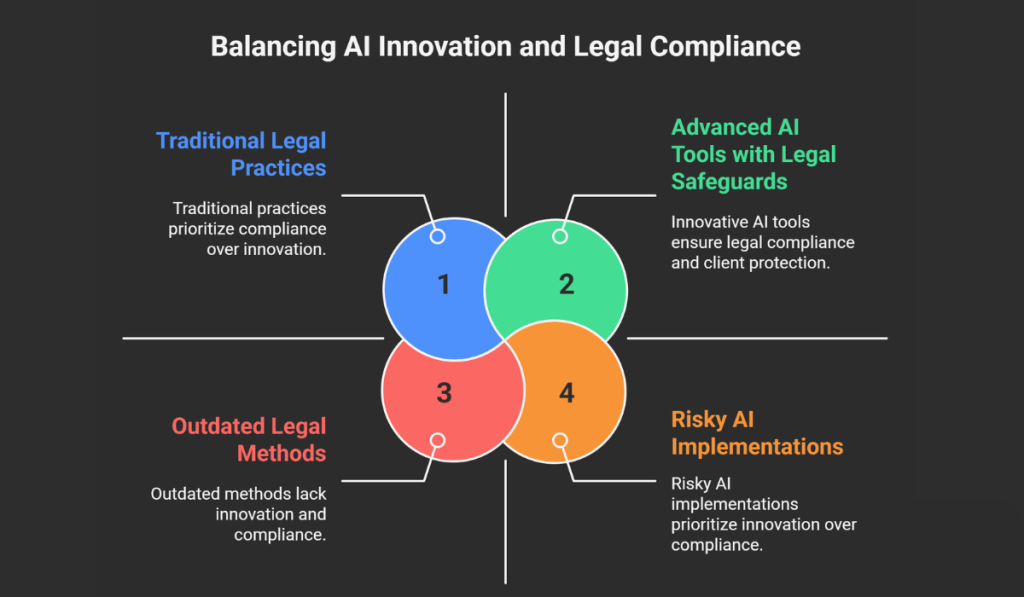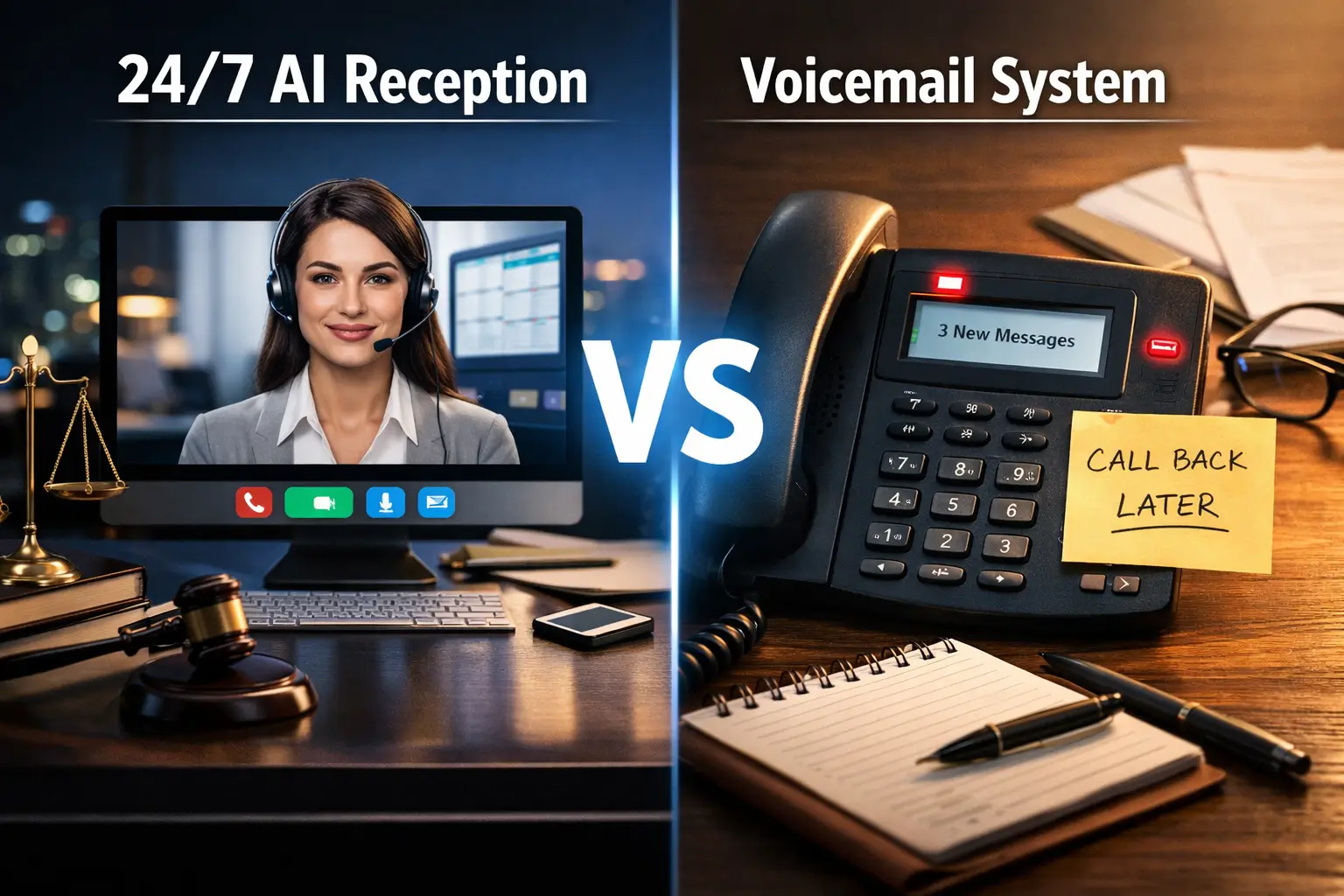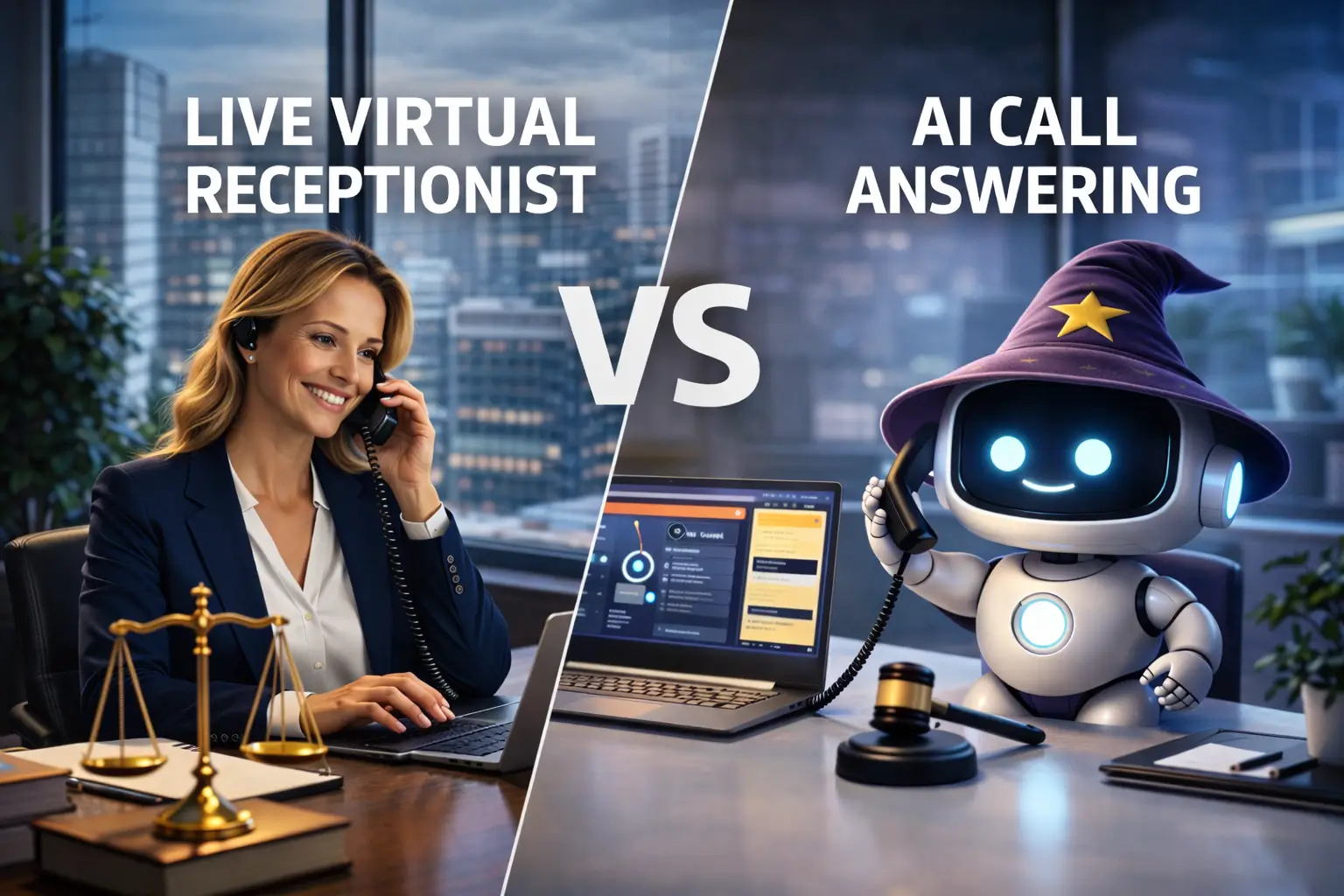
AI is reshaping how attorneys manage confidential communications. This guide outlines best practices for using AI in legal services—including AI calling systems and virtual receptionist tools—without compromising attorney-client privilege or confidentiality.
Artificial Intelligence in Confidential Legal Communication
Artificial intelligence (AI) is rapidly transforming the legal profession, handling tasks such as legal research, document review, and client communication. As law firms integrate AI into their workflows, it becomes essential to preserve the core principles of confidentiality and attorney-client privilege.
To use AI responsibly, firms must follow structured policies and ethical safeguards to prevent inadvertent exposure of sensitive information. Tools like AI legal assistants and AI phone agents can be secure and compliant when properly configured and monitored.
Best Practices for Using AI in Legal Services
When introducing AI tools into legal workflows, confidentiality and privilege should remain the highest priorities. The following best practices help ensure responsible AI adoption.
Clear Policies on AI Use
Law firms should develop clear internal policies governing how AI is used. These policies must define acceptable tasks for AI tools, specify what client data can be processed, and outline security requirements.
Advanced systems like TeleWizard, designed for law-firm communication, support policy enforcement through built-in data-handling controls and customizable workflows aligned with ethical standards.
Limit AI Access to Confidential Information
AI systems should have access only to the data necessary for their specific functions. Sensitive client information should be protected through data encryption, restricted access, and anonymization wherever possible.
Training AI to Understand Confidentiality
AI models used in the legal sector should be trained to recognize privileged communications and understand when information is confidential. Legal teams should regularly update these models to ensure they distinguish privileged data from general content.
Vendor Selection for AI Tools
Selecting the right AI vendor is critical. Firms should partner with providers that uphold strict security standards, offer transparent data-handling policies, and with wide experience in the legal industry.
Monitoring AI Outputs
All AI-generated content should be reviewed before sharing or filing. Monitoring helps detect errors or potential risks to attorney-client privilege and ensures that AI remains a support tool—not a decision-maker—within legal processes..
How AI May Jeopardize Attorney Client Privilege?
While AI offers major efficiency gains, improper use can put attorney-client privilege and confidentiality at risk. Below are common concerns and how advanced AI systems, such as TeleWizard, address them through secure, compliant design.
Disclosure to Third Parties
One of the most significant risks in using AI for legal communications is the inadvertent disclosure of privileged information to third parties. If AI systems are not configured correctly or lack proper safeguards, confidential information may be leaked without consent.
Advanced systems like TeleWizard mitigate this risk through identity verification, encryption, and access-control protocols. Each interaction is authenticated before any information is shared or processed, and data is handled within secure, encrypted environments to ensure that only authorized personnel can access client information.
Lack of Client Consent
A major concern arises when AI tools process client data without explicit consent, potentially violating ethical rules and client trust.
AI systems such as TeleWizard address this by allowing firms to include a clear disclaimer in the opening message, notifying callers they are speaking with an AI assistant and that the call may be recorded. This transparent step ensures client awareness and compliance with professional conduct standards.
AI Is Not Always Secure
Not all AI platforms meet the security and confidentiality standards required for legal use. Inadequate encryption, missing audit trails, or unrestricted access can all compromise sensitive data.
To address this, advanced systems like TeleWizard are developed with enterprise-grade security frameworks—including encryption both in transit and at rest, role-based access controls, and detailed logs. Such measures give firms confidence that automation will not come at the expense of client confidentiality.
AI “In the Room”: Managing Confidentiality and Privilege
As AI becomes embedded in daily legal operations, firms must treat it as a controlled, compliant participant in their processes. AI systems should only process data for legitimate purposes and allow firms to define data-retention limits and access permissions.
When properly managed, advanced platforms like TeleWizard keep all AI-assisted interactions within firm-controlled environments, ensuring full compliance with professional responsibility obligations.
Considerations for AI Usage
Maintain Confidentiality: Always protect client data when using AI; ensure no information is inadvertently shared.
Use Secure Tools: Adopt AI solutions that follow established security and encryption standards to prevent unauthorized access.
Obtain Client Consent: Clearly disclose when an AI system is involved and obtain explicit consent for data processing.
Monitor AI Behavior: Review AI outputs regularly for compliance and accuracy.
| AI Tool Usage in Legal Services | Risks to Attorney-Client Privilege | Mitigation Strategies |
| Generative AI | May unintentionally include or reveal confidential data | Use strict data-encryption and review outputs before release |
| AI for Legal Advice | Could blur lines between automation and legal counsel | Limit AI to administrative or intake tasks; ensure attorney oversight |
| AI in Legal Support | Risk of unauthorized data access by third parties | Apply role-based access controls and firm-level encryption |
Generative AI Use in Legal Practice
Generative AI tools can enhance productivity by generating drafts, legal summaries, and client communications. However, improper use could result in the unintended release of confidential information.
Law firms should establish review protocols for AI-generated content to ensure that sensitive details are never disclosed outside privileged boundaries. Systems like TeleWizard, used primarily for AI reception and client communication, can be configured to store or redact data according to each firm’s confidentiality policies.
Read more: Top Reasons Law Firms Are Adopting AI Receptionists
Security of AI-Generated Content
Every AI-generated document or transcript should undergo a manual review by licensed attorneys before being shared externally. Even when automation accelerates legal work, human oversight remains essential to maintain accuracy and confidentiality.
Using secure AI communication tools, such as TeleWizard’s encrypted calling systems, helps ensure that both voice and text data are managed within compliant environments.
Read next: The Future of Law Firm Client Intake with AI
Impact of AI on Legal Trends
AI continues to shape legal technology trends, pushing firms toward automation and data-driven insights. Attorneys should stay informed about new tools that balance innovation with professional responsibility, ensuring ethical AI use that protects privileged communication and client data.
The Role of AI Software in Legal Teams
AI software assists legal teams in automating routine tasks like document classification, scheduling, and research. When used correctly, these tools enhance productivity and allow lawyers to focus on strategy and counsel.
However, every implementation must include strict confidentiality protocols, training for staff, and continuous monitoring of AI outputs to avoid unintended data exposure.
Integrating AI with Legal Teams
Successful integration requires clear guidelines for how AI operates within a law firm. Systems should specify who can access what data, how information is stored, and when it should be deleted.
Advanced AI systems like TeleWizard let firms define these parameters, offering full administrative control to align with internal data-protection policies and industry regulations.
AI Tools and Confidential Client Data
AI tools can analyze large volumes of legal documents, they also have the risk of mishandling confidential client data. To lower this risk, firms should use encryption and limit the AI tool’s access to sensitive documents, so that it doesn’t get exposed.
AI Use in In-House Legal Departments
While AI legal tools can process large volumes of information, they also introduce risk if left unsupervised. Firms should use data-minimization techniques and encrypt sensitive files to prevent mishandling.
Limiting the scope of AI access is an essential step to keep client confidentiality intact.
AI Tools and Legal Ethics
Ethical compliance is central to any AI implementation. Firms must ensure that their AI systems respect attorney-client privilege, follow professional conduct rules, and avoid producing or storing unverified data.
Systems built for legal use—such as TeleWizard’s AI communication solutions—can help maintain this balance through ethical design and restricted data handling.
AI in Legal Research
AI platforms can assist with case law analysis, precedent search, and statutory research, drastically reducing research time. However, any tool accessing legal databases must be configured to exclude privileged client information from its training or outputs.
Regular audits and secure configuration are essential to ensure compliance during AI-assisted legal research.

Generative AI in Legal Work
Large language models (LLMs) have changed legal workflows by generating drafts, analyzing case summaries, and automating responses to client inquiries. Their efficiency is valuable, but firms must remain cautious to prevent breaches of privilege.
Legal professionals should review all AI-generated outputs and apply clear data-governance rules to keep sensitive client details confidential.
Protecting Confidential Information in AI Outputs
Every AI-generated message, note, or document should be carefully reviewed by a licensed attorney. This ensures that no privileged or sensitive content leaves the protected environment of the firm.
Regular audits, encryption, and document-access control are crucial to safeguarding confidential communications.
Using Generative AI Within Legal Boundaries
Attorneys should always use AI tools within the ethical and professional boundaries of the legal practice. Systems must be configured to ensure AI content remains within the attorney-client relationship and does not create unauthorized disclosures.
This approach ensures compliance with professional conduct rules while enabling firms to benefit from responsible AI innovation.
The Future of AI in Legal Services
The future of AI in the legal profession promises continued efficiency and innovation. Firms that combine automation with strong confidentiality safeguards will lead the industry in productivity and client trust.
Read more: How Law Firms Can Use AI Call Agents to Reduce Missed Calls
AI and Legal Services
AI technology will continue to revolutionize legal operations, from document review to contract analysis. As these tools advance, law firms must remain proactive in maintaining compliance with ethical and confidentiality standards.
AI Trends in the Legal Profession
To stay competitive, law firms should track emerging AI trends—especially tools that prioritize data privacy and attorney-client privilege. By adopting secure, transparent, and compliant AI systems, firms can unlock the full potential of AI while preserving client trust.
At The End
ntegrating AI into legal services improves efficiency and responsiveness, but must be balanced with ethical responsibility. By following clear policies, training AI models responsibly, and reviewing all outputs, law firms can use AI in full alignment with professional conduct standards and confidentiality requirements.
FAQs
How can AI jeopardize attorney-client privilege?
AI can compromise privilege if it unintentionally discloses confidential data to unauthorized third parties or mismanages privileged communications.
What are the best practices for using AI in legal services?
Develop clear usage policies, use encryption, train AI systems to recognize confidential information, and review AI outputs regularly.
Can AI tools be used in-house without risking confidentiality?
Yes, if in-house teams use strict access controls, limit data exposure, and ensure systems comply with corporate privacy policies.
How does generative AI impact legal work?
Generative AI accelerates document drafting and research but requires human review to ensure outputs don’t breach confidentiality or privilege.
What should law firms consider when selecting AI vendors?
Law firms should assess each vendor’s security standards, data-protection measures, and commitment to maintaining attorney-client privilege. They should also prioritize vendors with proven experience in the legal sector, offering client identity verification and controlled AI access to sensitive data to ensure all interactions remain secure and compliant.



